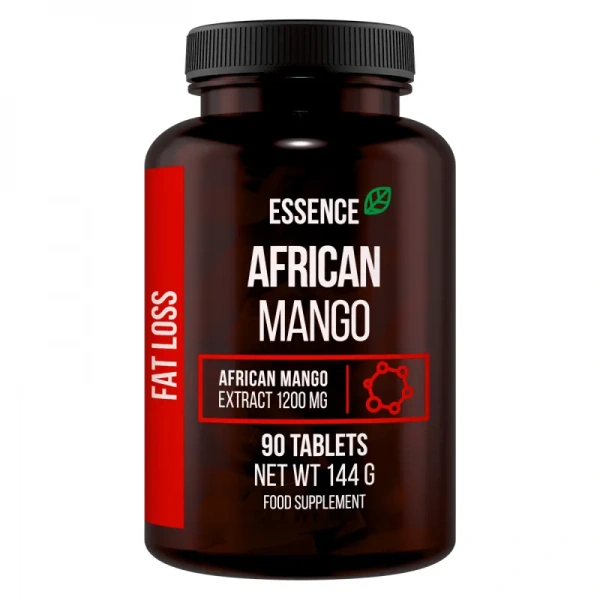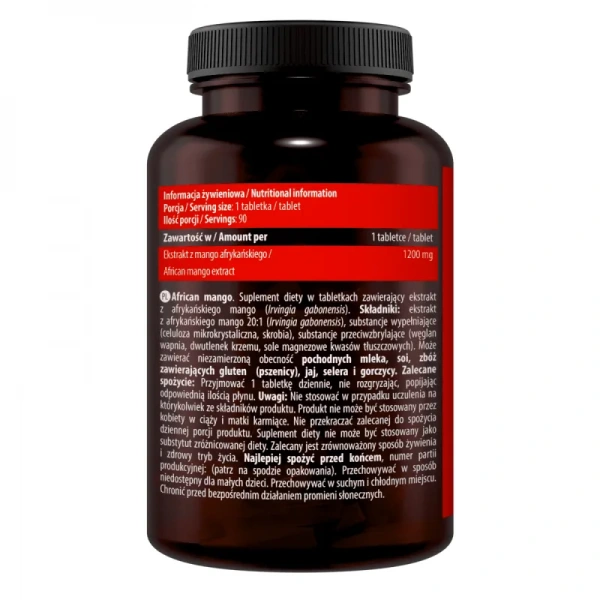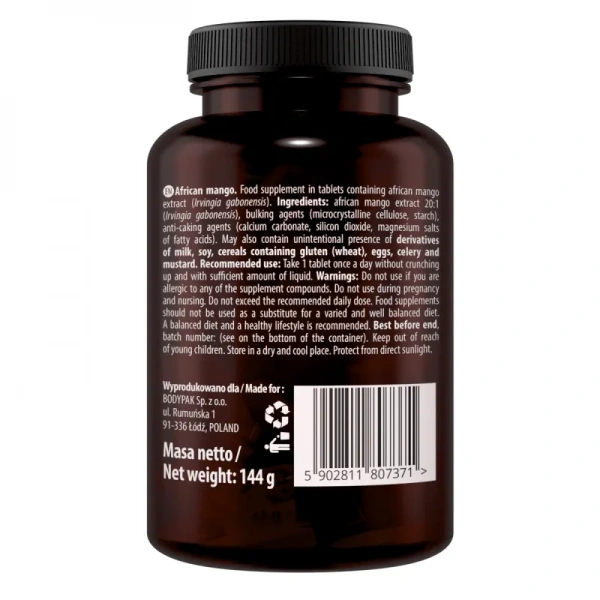Currency
- For the home
Health
- Bones and Joints
- Digestion and Healthy GI
- Essential Oils
- Fish Oil / Omega-3
- Healthy Sleep
- Heart and Cardiovascular System
- Immunity
- Liver
- MCT Oil
- Men
- Mind and Focus
- Minerals
- Pet Supplements
- Pro-Health Supplements
- Probiotics
- Senior
- Superfoods
- Urinary Tract
- Vitamins
- Vitamins for hair
- Vitamins for nails
- Vitamins for the skin
- Weight Management
- Woman
Healthy Diet
Herbs
Mother and Baby
Sport
Your Goal
Pet Supplements
Cosmetics
- Cosmetics for children
- Men's Cosmetics
- Unisex Cosmetics
- Women's Cosmetics
- Dezodoranty i perfumy
- Higiena jamy ustnej
- Kosmetyki akcesoria
- Kosmetyki dla dzieci2
- Kosmetyki do ciała
- Kosmetyki do higieny intymnej
- Kosmetyki do opalania
- Kosmetyki do pielęgnacji ust
- Kosmetyki do twarzy
- Kosmetyki do włosów
- Papier toaletowy / chusteczki
ESSENCE African Mango 90 Tablets
Available: 0 szt.
9,28 €
Price per portion: 0,10 €
Temporarily unavailable
Buy for 950 pts
After purchase you will receive 38 pts
You can exchange your accumulated loyalty points for this product. Log in to your account to check the number of available loyalty points.
After purchase you will receive 38 pts
After shipping your order, we will award you this amount of loyalty points. The loyalty program is available to customers who have an account in the store
Product Details
- Description
- Dosage
- Ingredients Table
- About the brand
- Nutritional information
- Reviews (0)
- Articles
African mango, or African mango (Irvingia gabonensis), is also known as wild mango or bush mango and differs from the popular Indian mango (Mangifera indica). African mangoes are valued for their dietary fiber and seeds rich in fats and proteins. In West Africa, the use of dried seeds of this plant has been common and has been known for hundreds of years.
Dietary fiber
According to the definition contained in the Nutrition Standards for the Polish Population, issued by the Food and Nutrition Institute, fiber, or dietary fiber, is a residue of plant cells resistant to human digestive enzymes; is a group of compounds that pass through the ileum as an undigested residue but are partially hydrolyzed by colon bacteria. It should be defined by at least one of 4 differentiators, i.e. fiber should affect: reduction of intestinal transit time and increase of fecal mass, stimulate fermentation processes in the large intestine, reduce blood levels of total cholesterol and LDL cholesterol fraction, and lower postprandial blood glucose levels and / or lowering insulin levels.
African Mango and research
The available scientific research shows that African mango has an effect on the human body due to the content of dietary fiber. In a 2005 double-blind study by Ngondi and Oben (published in Lipids in Health and Disease), the effects of Irvingia gabonensis were tested in two groups. The observed difference between the african mango group and the placebo group was significant. The body weight of the subjects consuming Irvingia gabonensis decreased to a greater extent. In addition, obese subjects decreased total cholesterol, LDL cholesterol, triglycerides, and increased HDL cholesterol. On the other hand, the placebo group showed no changes in blood lipid components.
Dosage
Take one tablet a day without chewing and washing down with a sufficient amount of liquid.
Ingredients
Container: 90 TabletsServing Size: 1 Tablets
Servings per Container: 90
Form: Tablet
Ingredients
Content in a portion
in 100 g
% RDI
African mango extract
1200mg
Other ingredients
African mango extract 20: 1 (Irvingia gabonensis), fillers (microcrystalline cellulose, starch), anti-caking agents (calcium carbonate, silicon dioxide, magnesium salts of fatty acids). May contain the unintended presence of milk derivatives, soybeans, grains containing gluten (wheat), eggs, celery and mustard seeds.
About the brand
Nutritional information
A dietary supplement / A nutrition supplement as a substitute for everyday diet, used for weight control.
Cannot be used as a substitute of a healthy and balanced diet.
Not to be used by pregnant or nursing women.
Do not exceed recommended dosage per day.
Keep out of reach of children.
Best before: date on the package
All descriptions are the property of the www.mass-zone.eu. Copying or distribution is strictly prohibited! As per the Copyright Act from February 4th, 1994.
Manufacturer: 6 Pack Nutrition
Cannot be used as a substitute of a healthy and balanced diet.
Not to be used by pregnant or nursing women.
Do not exceed recommended dosage per day.
Keep out of reach of children.
Best before: date on the package
All descriptions are the property of the www.mass-zone.eu. Copying or distribution is strictly prohibited! As per the Copyright Act from February 4th, 1994.
Manufacturer: 6 Pack Nutrition
Reviews
No one has written a review for this product yet. Be the first to write a review.
there is no articles
Customers also bought
No data to display
OTHER PRODUCTS FROM THIS CATEGORY
Dream skin, healthy hair and nails, also for future and nursing mothers! Everything…
11,72 €
Add to cart
ForMeds Bicaps Red Clover 60 vegetable capsules
Dietary supplement BICAPS® RED CLOVER contains 24 mg of isoflavones from red clover…
14,16 €
Add to cart
PiLeJe Feminabiane Meno'Confort (Relieves Menopausal Symptoms) 30 Tablets
Feminabiane Meno'Confort is a dietary supplement for women to alleviate the troublesome…
20,51 €
Add to cart
SWANSON Fenugreek Seed (Fenugreek) 90 Capsules
Popular herbal remedy for blood sugar and hormone support, digestive health…
5,86 €
Add to cart
GARDEN OF LIFE Dr. Formulated Probiotics Urinary Tract + 60 Vegetarian Capsules
Supports the health of the urinary tract. Provides support for the digestive…
46,15 €
Add to cart
ENZYMEDICA Lacto (Digestion of Milk) 30 Capsules
Many people have difficulty digesting meals containing dairy, resulting in discomforts…
21,98 €
Add to cart
NOW FOODS D-Mannose (D-Mannoza) 85g
Urinary tract health support - D mannose is a naturally occurring simple sugar that…
18,31 €
Add to cart
SWANSON FiberAid Larch Tree Arabinogalactan (AG) (Fiber, Digestion) 250g
FiberAid is a unique soluble fiber that offers superior benefits for gastrointestinal…
32,72 €
Add to cart
SWANSON Shatavari Root Extract 120 Capsules
A traditional Ayurvedic herb for the post- menopausal years Believed to help…
19,78 €
Add to cart
ForMeds BiCaps Libifem (Women's Sexual Health and Activity) 60 Capsules
BICAPS LibiFEM is a product designed specifically for women. It contains natural…
16,12 €
Add to cart
NOW FOODS Eve Superior Women's Multi 120 Vegetarian Capsules
HEALTH BENEFITS - NOW Foods Eve is one of the best products in the multivitamin…
19,53 €
Add to cart
SWANSON Menopause Essentials 120 Vegetarian Capsules
Herbal support to ease monthly menstrual discomfort Combines the omega-6 nutrition…
19,53 €
Add to cart
SWANSON Dong Quai (Tonic for Women) 100 Capsules
Nature's #1 tonic herb for women! A staple of traditional Chinese herbology, dong…
7,81 €
Add to cart
Graviola ekstrakt (550 mg) 60 kapsułek - soul farm
"SKŁADNIKIgraviola ekstrakt 550 mg, kapsułka: pullulanOPISSuplement diety. Zawartość…
10,50 €
Add to cart
SWANSON Chasteberry Fruit (Menstrual Pain Support) 120 Capsules
Chasteberry Fruit, also known as Vitex agnus- castus, has a long history of use…
9,03 €
Add to cart
PiLeJe PORPHYRAL HSP DERM (Skin irritation, Regeneration of the epidermis) 50ml
Recommended for use in: case of irritated and dry skin, situation requiring special…
19,53 €
Add to cart
ForMeds PRENACAPS Mag B6 (Magnesium + Vitamin B6 for Pregnant Women) 60 Capsules
PRENACAPS is a line of dietary supplements intended for women who are trying to…
12,21 €
Add to cart
ForMeds PRENACAPS OVI (Support for women planning pregnancy) 30 Servings
PRENACAPS is a specialist line of dietary supplements designed for women trying…
21,73 €
Add to cart
Himalaya AyurSlim (Digestion, Metabolism) 60 Capsules
Ayurvedic slimming formula. Exttract Garcinia cambogia helps in weight control,…
10,01 €
Add to cart
ForMeds PRENACAPS MULTI 2 + DHA (Complex for Women from the 13th week of pregnancy) 60 capsules
PRENACAPS is a line of dietary supplements intended for women who are trying to…
21,00 €
Add to cart
Newsletter
© 2023 mass-zone.eu. All rights reserved
Follow us



























